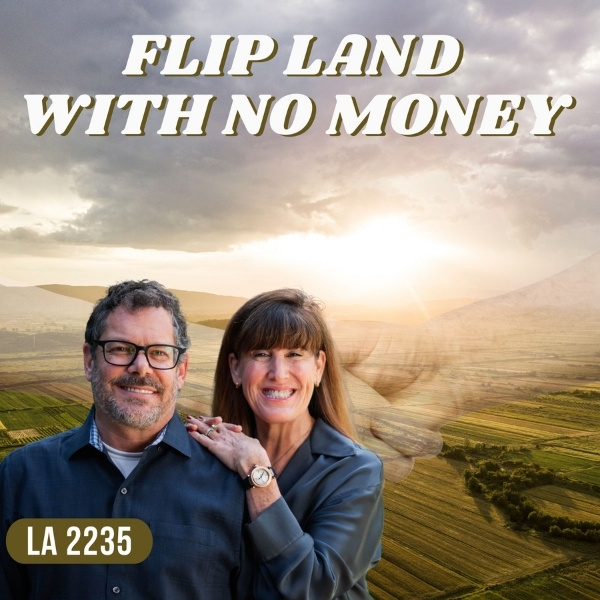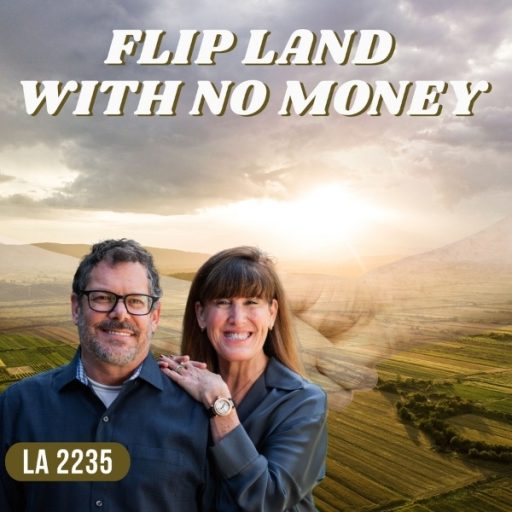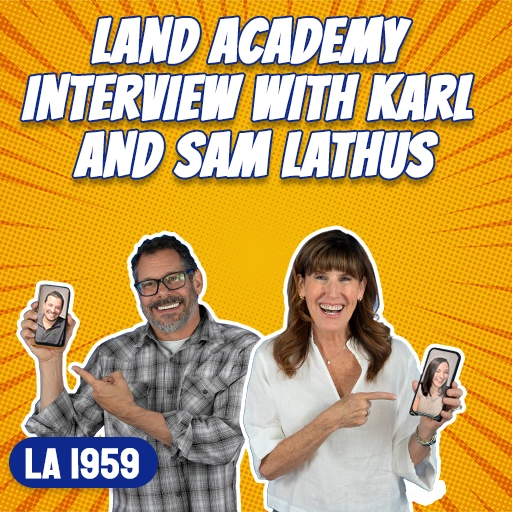The “No Money Down” Reality & How To Achieve It
This is episode number 2235. Jill and I are talking about, “Can you really flip land with no money down?” Yes, you can. I have to say, I hate this no-money-down thing. “You don’t need any money,” sounds so slimy.
The phrase clearly sings to people, or we wouldn’t all be using that phrase. We’ll explain more in a minute. The point is you don’t have to use your money to get a deal done. I talk to people a lot about this all the time. When they’re new and thinking about jumping into what we do, they’re like, “I only have $10,000. What properties can I get for $10,000?” I have to go, “Hold on a moment. Your bank account should not limit you to what you can do.” We’ll explain why.
If I were to title this episode, it would be something like, “Join Land Academy and sift through the hundreds of members that we have that are probably smarter than Jack and Jill, certainly smarter than me, because I’m brand new. I would find somebody willing to finance and fund the deal with me as my partner on the deal that I just found, that’s awesome, and future deals.” That’s what I would name this episode.
I was going to say, “Join Land Academy and get rich not spending a dime on your own money.” How’s that? It’s a little bit easier.
It’s a no-money-down business.
I know.
Every time I see a brand new car commercial, not for used cars, and they say, “No money down,” I think, “Business must be tough.”
Somebody paid for it.
It is like once you know when Volkswagen runs a zero campaign.
Here’s the point, too. We’ll talk more about this in a few minutes. This does not involve taking out a loan, running up any credit, or borrowing anything. We’ll get there.
Each day on the show, we answer a question from our Land Academy member Discord forum. We take a deep dive into land-related topics by popular request.
Where is it? There’s no question.
I used this question as the question. The question is, “Can you really flip land with no money down?” Here’s the answer. Yes, and here’s the catch. It’s not necessarily a catch. It’s just the meat. It’s the meat of what we’re talking about. When you find an amazing real estate deal, you have about three choices. Number one, you find it yourself. “Jack, I don’t have the money.” I get it. I’ve been there many more times than where I am now. Number two, take out a loan. Nobody wants debt. No one wants debt. It’s the 21st century, 2025.
We all know taking out debt is bad on anything with the possible exception of a first-position mortgage on your house. What’s my third option? It is partnering with somebody like Jill and me. You do not need any money at all to get wealthy relatively quickly, and with prediction in buying and selling land. I was running on Facebook because we bought the sailboat. I’m out there just looking at what other people are doing from a sailing perspective, groups, and the whole thing.
I came across somebody who said this. “I need to make $100,000 in four months for a bunch of reasons. What’s the best way to do it?” You know, Facebook. There are all these snarky, ridiculous comments about selling your body and all kinds of other stuff. To which I said, first in my mind, and then I typed it out, “Buy a house and resell it for $100,000 more.” It got a lot of attention. Buy a $400,000 house and sell it for $500,000. “I need $100,000. I can’t do that.”
You need $400,000 to do it.
If the house is worth half a million dollars, you have secured a purchase agreement, and you have a relationship with the seller who says, “I need to sell this thing for $400,000. It’s fine. I just need to close it in 30 days,” call us.
It’s probably worth $550,000 in its current condition.
We’ll do a partnership.
If it is all fixed up, it’s worth $600,000 or $700,000. That’s what you’re looking for. They’re out there all the time.
We’re not going to fix it up.
No, we’re not going to do that.
The Benefits & Structure Of Partnerships
We’re going into a partnership to deal with you because you found it. A certain percentage of the proceeds when we resell it is going to go straight to you. A percentage is going to go to us for taking the risk with you. We’re not going to clean it up. We’re not going to look at ARV. That’s just what we do. We do this all the time on both sides. Sometimes, we find the deal and go get partnership funding. We have a couple of people in the House Academy that we partner deals with. You get ten good deals. If you send out 500,000 mailers, you’re going to get ten great.
You’re going to run out of money.
If you’ve got ten deals that are “buy for $300,000, sell for $400,000” for the sake of argument, you need $3 million to buy those houses. People line up. They will for you. This is my point. They’ll line up to give you money.
The whole point for me is, especially when you’re talking, it doesn’t matter what the asset is. You’re going to know. It’s going to be a smoking deal. If you’re excited about it, and you’re looking around, going, “What can I sell? Before I go take out money, I’m going to just bring in a partner,” they’ll confirm it with you. That’s another thing, too. You have another pair of eyes. They’re taking the risk. It’s their money, by the way, that’s going down. They’re also going to double and triple-check that it’s a really good deal with you. You both proceed. It’s so easy. I love it.
Do you know what usually happens? This is the picture that I paint when I talk to people who are new coming into the Land Academy. They’re explaining, “Jill, I’ve got $50,000 to play with. How can I turn this into five times that?” My number one thing is, don’t think about the asset at all. I want you to follow what Jack does, learn to go find, buy, and queue up what everybody else wants in that area. You’re going to learn how to fish or troll. You’re going to see, “Look at this little area over here right now. Everything in this area is between $60,000 and $80,000. They keep going under contract within 30 days. I need to know all five-acre properties. I see it. I need to go buy those. They’re all $60,000 to $80,000.”
Scalability & Transitioning To Independent Deals
You’re buying them for $20,000 to $25,000 is what you’re aiming for. You can only buy one or two of them. It’s not going to work to get there fast. You go out there and go get them. Bring them to us, and we’ll fund them all day long with you. What happens is, let’s just say, we make it easy. We split the profits 50/50. Every time it closes, you get half of the profit. I get half the profit and my original investment back.
After about three or four of those, you’re going to go, “Thank you,” and I’m going to be like, “This is great.” You got some more, and you’re going to go, “Hold on, Jill. I don’t need your money anymore.” Now, you’re not splitting the profit. You’re doing your own deals. What often happens is, five more deals go by, you’re like, “I’m going to be the Jill and the Jack. I’m going to be the bank for somebody else.” Watch that happen while you’re doing your own deals. That’s what you do.
It’s partnerships. The whole thing can be summarized in that one word. You’re taking on a partner. You’re taking the risk together. You will split the proceeds in some manner, whatever you agree on right up front. The big criticism that this model gets constantly is, “My cost of capital is incredibly expensive.” Yes, but what’s your risk? Your risk is zero. If you raise capital through a partnership situation, the deal goes south, you stop answering the phone, and let’s say you do it with us, we own the property. Then, we’re going to figure it out on our own.
If you go dark, then we’re not going to pay you, but why would you go dark? It never happens. My point in saying that is this. You have no risk. People who have no experience love to criticize partnerships because they’re expensive. Let me tell you about this partner that I took on, Jill. My business is ten times. Not only did she save the existing business that I had, which would certainly be out of business if we didn’t join forces. Her bringing her sales, her positive attitude, and a bunch of other stuff were desperately needed. She turned the business around and did it amazingly.
Thank you.
I think about how many people are reading this who don’t have $25,000 to buy a piece of dirt or $400,000 to buy a house. It is the vast majority. “It might be the greatest deal ever, but I’m not going to try it. I’m not going to do this because I don’t have the cash.” You do. Join us in the next episode, where Jill and I are discussing why double closing land rarely works and how to do it right. You are not alone in your real estate ambition. We are Jack and Jill, information and inspiration to buy undervalued property.















